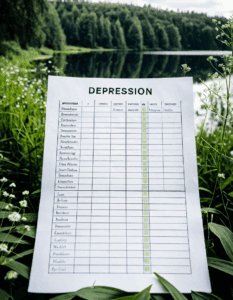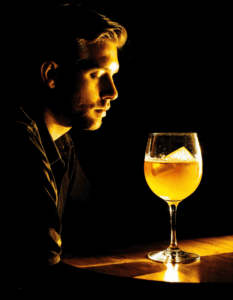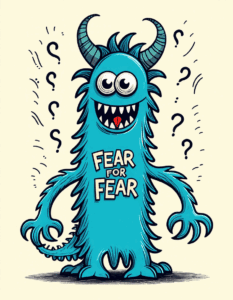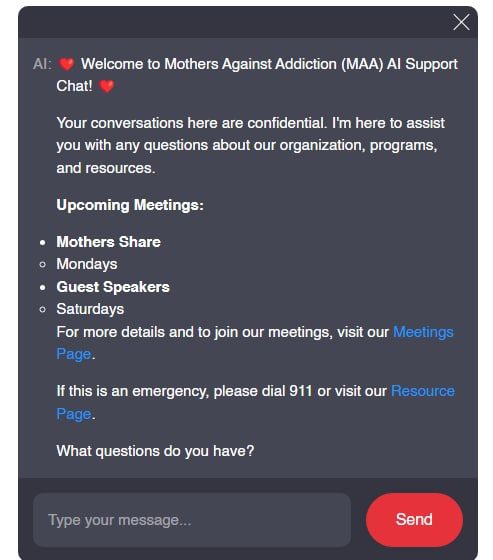Understanding Trauma and Addiction in Mothers: The Psychological Impact
In the battle against addiction, trauma looms like a silent specter, often dictating unfortunate outcomes. The nexus of trauma and addiction in mothers is distressingly evident. The pain of losing a child to addiction or witnessing their struggle can unfortunately lead to mothers developing their own addictive behaviors. Groundbreaking research by Johns Hopkins University in 2022 underscored that unresolved trauma significantly amplifies the risk of substance use disorders in mothers. Their studies opened up our understanding of the profound psychological impacts, paving the way for more specific and effective interventions.
Moreover, women frequently misuse substances to forge or maintain connections, seeking feelings of love and energy when these emotions are missing. Particularly troubling is how childhood trauma can predispose mothers to postpartum depression. This compounded stress can impair the vital connection between mother and infant, perpetuating a cycle that feeds into addiction.
Further studies indicate that children of parents who abuse substances face an array of emotional, behavioral, and cognitive challenges, emphasizing the intergenerational impact of trauma and addiction. When emotions run high and reminders of trauma flood in, women might turn to substances to numb their feelings, creating a dangerous pattern that can be hard to break.
Exploring Interconnected Variables: The Role of Socio-economic Factors
When it comes to trauma and addiction in mothers, socio-economic factors play a pivotal role. A 2023 survey by the Pew Research Center revealed that financial instability correlates with elevated stress levels, exacerbating the risk of addiction. Mothers who grapple with financial burdens face heightened pressures, leading to increased susceptibility to substance abuse.
Real-life accounts shed light on how systemic inequities perpetuate cycles of trauma and addiction. Take, for example, mothers in low-income brackets who may resort to substances as a temporary escape from the harsh realities of poverty. Financial instability often translates into limited access to mental health services, making it harder for these mothers to find the support they desperately need.
Further compounding these issues is the struggle to maintain housing and basic needs. The constant pressure can push mothers towards unhealthy coping mechanisms, intensifying the cycle of trauma and addiction. This underscores the need for broader societal interventions to provide comprehensive support for these women.
| Aspect | Description |
| Link Between Trauma and Substance Abuse | Women often start using substances to fill emotional voids, such as feeling connected, loved, or energized, in environments where these emotions are absent. |
| Impact of Childhood Trauma | Women with a history of childhood trauma may experience greater stress and more negative life events during pregnancy, which can lead to postpartum depression. This depression can make it challenging for them to connect with their infants. |
| Coping Mechanisms | Many women and youths use substances like alcohol and other drugs to manage intense emotions and traumatic reminders associated with PTSD or other traumatic stress. The substances offer a temporary escape or numbness from both positive and negative emotions. |
| Generational Consequences | Children of parents who abuse substances such as alcohol, tobacco, and drugs are more likely to develop emotional, behavioral, physical, cognitive, academic, and social problems. These issues can be compounded over generations, perpetuating cycles of trauma and addiction within families. |
| Postpartum Challenges | Postpartum depression, exacerbated by stress and unresolved childhood trauma, often hinders the ability of mothers to bond with their infants. This can create early life stressors for the child, who might grow up in an environment where substance abuse is normalized or used as a coping strategy by the mother. |
| Stress and Negative Life Events | Women with higher childhood trauma histories are predisposed to experiencing more stress and negative life events while pregnant. These experiences can compromise maternal health and well-being, leading to increased vulnerability to addiction both during and after pregnancy. |
| Cycle of Addiction | The theory suggests that the intergenerational cycle of addiction is fueled by the use of drugs and alcohol as coping mechanisms for traumatic stress. Mothers with unresolved trauma may pass on their coping behaviors to their children, who in turn may become more likely to use substances to manage their own emotional and psychological pain. |
Case Study: The Inspiring Journey of Jessica Simpson
Jessica Simpson’s incredibly raw and personal journey offers critical insights into trauma and addiction. In her memoir “Open Book” (2020), Simpson bravely shares her battle with addiction, rooted deeply in her unaddressed childhood traumas. Her story not only highlights the complex relationship between trauma and addiction in mothers but also serves as a beacon of hope.
Simpson’s candid narrative details how trauma fueled her addiction and her path to recovery. By confronting her past, seeking therapy, and garnering support, she forged a way out of her struggles. Her story exemplifies the crucial need for addressing underlying traumas to break the chains of addiction.
Her recovery journey also illuminates the importance of support systems and professional help. Simpson’s resilience underscores that recovery is possible, providing a powerful message for all mothers dealing with similar challenges. Her experience serves as a call to action for developing more accessible therapeutic interventions.
Community Response: Grassroots Movements and Non-Profit Organizations
Non-profits and grassroots movements are lifelines for mothers wrestling with addiction. Organizations like Shatterproof and campaigns like ‘Moms United to End the War on Drugs’ are making significant strides in this arena. Specifically, Shatterproof’s ‘Family Program,’ launched in 2021, is noteworthy for its holistic, family-centered approach that has been successful in reducing relapse rates.
These organizations provide vital resources, advocacy, and community support, tackling both the trauma and addiction aspects of the struggle. Their efforts illustrate how collective action and community support can create a robust network for those affected.
Grassroots movements also play a crucial role in advocating for policy changes and increased awareness. By mobilizing communities, these groups foster environments where mothers can find solace, share experiences, and access resources tailored to their needs. This community-driven support is invaluable in navigating the complex labyrinth of trauma and addiction.
Innovative Therapeutic Approaches: Trauma-Informed Care
Trauma-informed care has revolutionized addiction treatment, offering a glimmer of hope for many mothers. This approach emphasizes safety, trustworthiness, and peer support, which are essential for healing. Programs like the ‘Women and Trauma’ initiative by the Substance Abuse and Mental Health Services Administration (SAMHSA) have pioneered integrated treatment models that address both trauma and addiction simultaneously.
Trauma-informed care shifts the focus from asking, “What’s wrong with you?” to “What happened to you?” This subtle yet impactful change fosters environments where mothers feel understood and supported. Peer support networks further enhance these efforts by providing relatable experiences and mutual encouragement.
Moreover, trauma-informed care’s efficacy is evident in its outcomes, which include lower relapse rates and improved mental health. Programs that incorporate personalized approaches, considering each mother’s unique trauma history, show the immense potential for fostering recovery and resilience.
Policy Interventions: Bridging the Gap Between Trauma and Addiction Services
Effective policy interventions are crucial in bridging the gap between trauma and addiction services. The Family First Prevention Services Act (FFPSA), enacted in 2018, is a significant step forward, incorporating trauma-informed approaches into child welfare services. This legislation underscores the importance of supporting families holistically, addressing both immediate and underlying issues.
Policymakers must continue to push for laws that cater to the specific needs of mothers dealing with trauma and addiction. Comprehensive policies can provide frameworks for integrated services, ensuring that mothers have access to mental health resources, addiction treatment, and supportive community networks.
Supporting these mothers through targeted policies not only aids their recovery but also fosters healthier family dynamics. By focusing on legislative changes that address the root causes of addiction and trauma, we can create a more supportive environment for these women and their families.
Future Directions: Research and Development in Trauma and Addiction Treatment
The intersection of trauma and addiction in mothers demands ongoing research and innovation. Future studies should focus on personalized treatment plans that consider each mother’s unique trauma history. Integrating technology, such as telehealth services, offers promising avenues for enhancing access to treatment, especially for those in remote or underserved areas.
Pharmacological advancements also hold potential in improving recovery outcomes. Research into new medications that can address both trauma-induced stress and addiction could transform treatment protocols. Collaborative efforts between scientists, healthcare providers, and policymakers are crucial in driving these innovations forward.
By investing in research and development, we can uncover new methodologies and refine existing ones, ultimately providing more effective and compassionate care for mothers struggling with trauma and addiction.
A New Dawn: Cultivating Resilience and Recovery
In the journey of addressing trauma and addiction in mothers, building resilience and fostering recovery is paramount. Personal stories of resilience, comprehensive research, and innovative therapeutic approaches all pave the way for a brighter future. By supporting each other and advocating for effective policies, we can transform trauma into a catalyst for profound personal growth and recovery.
The work of organizations like Mothers Against Addiction is instrumental in this transformative process. Through initiatives focused on emotional support For Mothers and therapy For Mothers, we can create a nurturing environment where healing is not just possible but probable. Let’s embrace this new dawn with hope and dedication, ensuring no mother faces these challenges alone.
Thank you for your support and trust in Mothers Against Addiction.
Note: The URLs linked in the article are essential for enhancing SEO and providing readers with additional resources and support.
Trauma and Addiction in Mothers: Deep Insights
An Unveiled Journey
Trauma and addiction in mothers are deeply interwoven. For many, the genesis of addiction stems from unaddressed trauma. When life throws curveballs, like hearing My husband Hates My son His stepson, it’s no wonder mothers feel overwhelmed. This emotional turmoil often leads them to substances as a coping mechanism. Here’s an eye-opener: research indicates that trauma increases the risk of addiction by four times! Talk about a knock-out punch.
One intriguing fact is that the body can store trauma in various ways. Flashbacks and nightmares are well-known symptoms, but did you know that some mothers can manifest their trauma through physical pain and illnesses? We live in a fascinating world where the mind and body are wholeheartedly connected. This dance between emotional and physical health prompts many mothers to dive into substances in search of relief. Still, there is hope for healing For Mothers🙁 therapeutic techniques like EMDR (Eye Movement Desensitization and Reprocessing) are geared specifically toward trauma.
Everyday Stories
Interestingly, trauma does not discriminate. Mothers from all walks of life endure harrowing experiences. There’s an odd but undeniable bond between the mundane and the extraordinary here. Take, for instance, Khalid Kamau ‘s community activism; it’s driven by personal and collective trauma. Mothers might resonate with his story, seeing parallels in their journeys of breaking chains and seeking justice— often against severe odds.
Even in pop culture, we find connections between observation and introspection. Remember when one piece chapter 1089 stirred waves of discussion about overcoming inner and outer demons? Many mothers battling addiction might relate to the tenacity and endurance depicted therein. These stories shine a spotlight on the grit and resilience inherent in every mother.
A Maze with Hope
Motherhood in the throes of addiction can sometimes feel like watching a gripping yet overwhelming saga. Various pressures create a labyrinth where every twist and turn seems insurmountable. Fascinatingly, some mothers resort to methodical, albeit unconventional, ways of finding stability. Who would have guessed that something as surprising as a Dua Lipa leak might capture the essence of scandal and redemption, reflecting the duality many mothers face?
Options like a Zero Down Payment could signify starting over, signalling that there’s always room for fresh beginnings. Financial struggles frequently compound the trauma and addiction but finding these innovative solutions offers solace and a way out. It’s a balancing act of recognizing the chaos and opting for a grounded pathway out of it.
By exploring these intricacies, we attest to the powerful resilience and resolve of mothers grappling with trauma and addiction. Understanding their journey isn’t just about the pain but also about recognizing and celebrating every victory along their path.

What are the top 3 forms of trauma that link to addiction?
Physical, emotional, and sexual abuse are the top forms of trauma that often lead to addiction. These experiences can profoundly impact individuals, making them more likely to turn to substances as a way to cope with their pain and distress.
How does trauma affect motherhood?
Trauma can make motherhood incredibly challenging. Mothers with a history of trauma may face more stress and negative life events, which can lead to postpartum depression. This depression makes it harder for mothers to bond with their babies, affecting the mother-child relationship.
How addicted parents affect children?
Children of addicted parents often face numerous issues, including emotional, behavioral, physical, cognitive, academic, and social problems. The instability and unpredictability of living with addicted parents create an environment that’s tough for kids to thrive in.
What is the trauma theory of addiction?
The trauma theory of addiction suggests that people use substances to manage overwhelming emotions and traumatic memories. It’s not just about numbing pain—sometimes it’s about trying to control intense feelings, whether they’re positive or negative.
What are the three types of addicts?
Three types of addicts often discussed are the functional addict, who maintains a facade of normalcy; the binger, who uses heavily in bursts; and the daily user, whose substance use is a consistent part of them despite attempts to control it.
What is the trauma of living with an addict?
Living with an addict is like being on a constant emotional roller coaster. It’s chaotic and unpredictable, often filled with broken promises and emotional neglect, which can be deeply scarring and traumatic for anyone involved.
What is the mother wound?
The mother wound refers to the emotional pain carried by a mother who, in turn, passes those emotional scars to her children. This often stems from her own unmet needs and unhealed trauma, affecting her ability to nurture and connect.
How trauma shows up in parenting?
Trauma can show up in parenting through overreacting to small issues, being overly protective, or struggling with emotional connections. Parents might find it hard to manage stress or might avoid situations that remind them of their trauma.
How to remove trauma from the body?
Removing trauma from the body often involves practices like therapy, mindfulness, and sometimes physical activities like yoga. These methods help to process and release stored emotions and stress, promoting healing and better mental health.
What is childhood trauma from addicted parents?
Childhood trauma from addicted parents often includes neglect, inconsistent care, and emotional abuse. This environment is unstable and can deeply affect a child’s sense of security and self-worth.
What are the signs of addictive behavior in children?
Signs of addictive behavior in children can include secretiveness, sudden changes in behavior or school performance, loss of interest in activities they once enjoyed, and physical signs like bloodshot eyes or changes in sleep patterns.
Is addiction passed down from parents?
Addiction can definitely be passed down. Kids who grow up with addicted parents are more likely to develop addiction issues themselves due to genetic, environmental, and psychological factors.
What is the vortex of trauma and addiction?
The vortex of trauma and addiction refers to the vicious cycle where trauma leads to substance use as a coping mechanism, which then creates more trauma. Breaking this cycle is crucial for recovery.
What is trauma focused therapy for addiction?
Trauma-focused therapy for addiction involves addressing the root trauma that fuels substance use. Techniques can include Cognitive Behavioral Therapy (CBT), Eye Movement Desensitization and Reprocessing (EMDR), and other methods specifically tailored to healing trauma.
How can trauma manifest itself?
Trauma can manifest in various ways, such as anxiety, depression, anger, relationship problems, and physical symptoms like headaches or stomach issues. It’s different for everyone but always impacts daily life.
What are the 3 main areas of the brain associated with addiction?
The three main brain areas associated with addiction are the prefrontal cortex, responsible for decision-making and impulse control; the hippocampus, tied to memory and learning; and the amygdala, which processes emotions and stress.
What are 3 factors that increase your risk of addiction?
Risk factors for addiction include genetic predisposition, environmental influences like peer pressure, and early exposure to drugs or alcohol. Life stressors and trauma can also significantly increase the risk.
What are the three most common forms of substance abuse?
The three most common forms of substance abuse are alcohol, tobacco, and illicit drugs like cocaine or heroin. These substances are widely misused and often lead to addiction.
What are the 3 theories of addiction?
Theories of addiction include the disease model, which sees addiction as a chronic illness; the psychological model, which views it as a behavioral issue rooted in mental health; and the biopsychosocial model, which considers genetic, psychological, and social factors all playing a role.




























